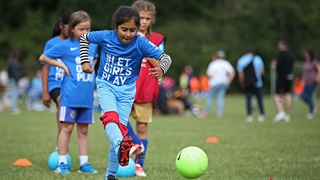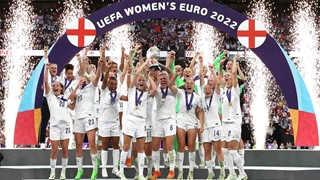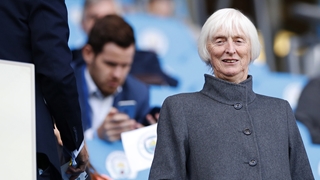
We can today provided an update on the progress made across our women’s and girls’ game strategy – Inspiring Positive Change – since it launched in October 2020.
The strategy aimed to create a sustainable future for women’s and girls’ football in England through eight transformational objectives to be achieved by 2024. Following a historic 18 months that saw England become UEFA Women’s EURO 2022 champions and FIFA Women’s World Cup 2023 finalists, significant progress has been made across all priority areas.
Inspiring Positive Change set out the target for 75 per cent of schools to be delivering equal access to football in PE lessons by 2024. Thanks to the work carried out by teachers, the Barclays Girls’ School Football Partnerships, and the Lionesses following their EUROs victory, that target has been met one year ahead of schedule.
The Lionesses used the momentum from their EUROs victory to petition the Prime Minister to give girls equal access to football in schools. On International Women’s Day in March 2023, the Government announced that girls would receive equal access to all sport in schools, including football. On the same day, 285,000 girls took part in the Let Girls Play Biggest Ever Football Session at schools across the country, a significant increase from the 90,000 that participated in 2022, showing the impact the team has had on inspiring girls to play.
Outside of school, between October 2022 and October 2023 there has been a 12 per cent increase in the total number of affiliated females playing football and an 18 per cent increase in the number of affiliated female youth players. In addition, there has been a 39 per cent increase in the total number of female youth teams since October 2021 – made up of girls aged between 5-18 years old – with a 17 per cent increase since October 2022.
There has also been substantial growth across refereeing and coaching. Between October 2021 and October 2023 there was a 78 per cent increase in the number of female referees across all levels and an 83 per cent increase in the number of active female coaches with Level 1 qualifications and above.
Inspiring Positive Change set clear Equality, Diversity and Inclusion (EDI) objectives when it launched and has now met its target of 100 per cent of County FAs having EDI plans specifically for the female game, whilst 88 per cent of County FAs are currently offering FA-developed ‘football for fun’ recreational opportunities for adult women from all communities, with the aim of hitting 100 per cent by 2024.
The drive to make the professional game more accessible and representative of society has also taken great strides in the last 12 months with the talent pathway reformed. There are now 73 Emerging Talent Centres (ETCs) in place, feeding a diverse pipeline into the 21 established Professional Game Academies. In their second year of operation, there has been a 93 per cent increase in the number of registered players at ETCs, with a 25 per cent increase in the number of players from socio-economically deprived areas and a ten per cent increase in players from underrepresented groups.
The women’s professional game has also met various targets ahead of schedule. The 2023 Women’s FA Cup Final sold out Wembley for the first time, whilst the average Barclays Women’s Super League attendance now stands at 7,457 surpassing the 6,000-target set for 2024, and the league is now the most socially followed women’s football league in the world. The Barclays WSL has also seen record viewing figures and attendance records, with 59,042 fans turning out at the Emirates for Arsenal v Chelsea in December 2023.
Baroness Sue Campbell, our director of women’s football, said: “Our ambition to create a sustainable future for the women’s and girls’ game is shaping up to be a reality, with the power of football changing lives and opening up opportunities to a brand-new generation of women and girls. The transformational growth we are seeing across the game has been spearheaded by our trailblazing Lionesses and the legacy they have created for the generations of girls who will come after them.
“As we enter the final year of Inspiring Positive Change, I want to extend my thanks to everyone who has played a part in this historic period for the women’s and girls’ game. From our commercial partners and our talented teams at the FA and County FAs, to the players, coaches, referees and volunteers who dedicate countless hours to the game, none of what has been achieved over the last three years would have been possible without the collective efforts to drive positive change. We still have a long way to go for the game to get to where we want it to be, but the future of women’s and girls’ football has never been brighter.”










